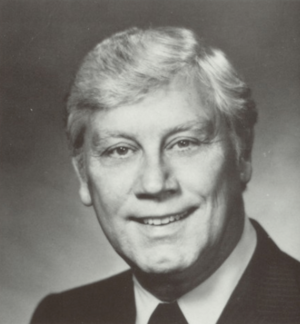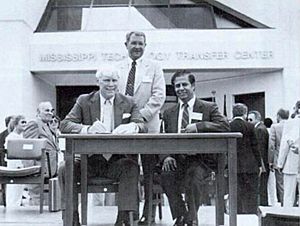William Allain facts for kids
Quick facts for kids
William Allain
|
|
|---|---|
 |
|
| 59th Governor of Mississippi | |
| In office January 10, 1984 – January 12, 1988 |
|
| Lieutenant | Brad Dye |
| Preceded by | William F. Winter |
| Succeeded by | Ray Mabus |
| 36th Attorney General of Mississippi | |
| In office January 22, 1980 – January 10, 1984 |
|
| Governor | William Winter |
| Preceded by | A. F. Summer |
| Succeeded by | Edwin L. Pittman |
| Personal details | |
| Born | February 14, 1928 Washington, Mississippi, U.S. |
| Died | December 2, 2013 (aged 85) Jackson, Mississippi, U.S. |
| Resting place | Natchez City Cemetery Natchez, Mississippi |
| Political party | Democratic |
| Spouses | Doris Rush (married, 1964-1970: divorced) |
| Education | University of Notre Dame (BA) University of Mississippi (LLB) |
| Military service | |
| Allegiance | |
| Branch/service | |
| Years of service | 1950-1953 |
| Battles/wars | Korean War |
William Aloysius Allain (February 14, 1928 – December 2, 2013) was an American politician and lawyer. He served as the 59th Governor of Mississippi from 1984 to 1988. He was a member of the Democratic Party.
Born in Adams County, Mississippi, William Allain studied at the University of Notre Dame. He earned a law degree from the University of Mississippi School of Law in 1948. He served in the U.S. Army during the Korean War. After his military service, he practiced law in Natchez.
In 1962, he became the Assistant Attorney General of Mississippi. Later, in 1979, he was elected Attorney General of Mississippi. As Attorney General, he worked to stop utility rate increases. He also took legal action to remove state lawmakers from executive boards. This was to ensure a clear separation of powers in government.
William Allain became governor in January 1984. During his time, he opposed tax increases. He also tried to get a new state constitution approved, but it did not pass. He left office in January 1988 and started a law practice in Jackson. He passed away in 2013 after getting pneumonia.
Contents
Early Life and Career
William Allain was born on February 14, 1928, in Washington, Adams County, Mississippi. He went to public schools in the county and graduated from Natchez High School. He studied law at the University of Notre Dame. In 1948, he enrolled at the University of Mississippi School of Law, earning his law degree in May 1950.
After law school, Allain opened his own law office in Natchez. When the Korean War began, he joined the United States Army infantry. He was honorably discharged in 1953 and returned to his law practice. He was a member of the American Legion and Veterans of Foreign Wars.
In 1962, he was appointed Assistant Attorney General of Mississippi. In this role, he represented the state government in various courts. He helped the state during important legal cases, including the integration of the University of Mississippi. He left this position in 1975 and practiced law in Jackson until 1979.
Political Journey
Attorney General Role
In 1979, William Allain decided to run for Attorney General of Mississippi. He was a Democrat and faced Republican Charles W. Pickering in the election. Allain won the election on November 6.
As Attorney General, Allain became known for protecting consumers. He fought against increases in utility rates. He also worked to prevent nuclear waste from being stored in Mississippi.
In 1981, Allain advised 36 members of the Mississippi State Legislature that they should not serve on executive boards. He believed this went against the idea of separation of powers in the Mississippi Constitution. This means that the different parts of government (like lawmakers and the governor) should have separate jobs. When the legislature did not act, Allain took legal action. The case went to the Supreme Court of Mississippi, which agreed with Allain. The court ordered the lawmakers to leave their executive positions.
Running for Governor in 1983
In 1983, Allain decided to run for governor. He was one of several candidates in the Democratic primary election. Allain gained attention for his efforts to have a convicted murderer executed. He came in second in the primary and then won against Evelyn Gandy in a runoff election.
In the general election, Allain faced Republican candidate Leon Bramlett. Allain ran a campaign that focused on helping everyday people. He highlighted his work as Attorney General in stopping utility rate increases. On November 8, Allain won the election with 55 percent of the votes.
Serving as Governor
William Allain became Governor of Mississippi on January 10, 1984. He was the first Roman Catholic to hold this office.
In 1984, a new law was passed that removed lawmakers from executive boards, as Allain had pushed for. Allain was strongly against raising taxes. In 1985, he vetoed a bill that would have raised taxes to increase public school teacher salaries. This led to the first teacher strike in Mississippi's history. The legislature eventually voted to override his veto, meaning they passed the bill despite his objection. His strong stance against tax increases led to less funding for some state services during his time as governor.
Allain also focused on changing the State Highway Department. He wanted a single director, appointed by the governor, to lead it instead of a three-member elected commission. When he couldn't get this change, he vetoed a highway funding bill in 1986. He even tried to take control of the department's finances to move unused money into the state's general fund. An audit later showed the department had $23 million in unspent money.
In 1987, lawmakers and business people proposed a plan to greatly expand the state's four-lane highways. This plan, called AHEAD, would be paid for by a five-cent increase in gas taxes. Allain proposed his own plan, which included highway construction and highway department changes, but without the tax hike. He suggested using bonds instead. Allain vetoed the AHEAD bill, saying he would not support a program with "undue tax increase." However, the legislature overrode his veto.
In 1985, Governor Allain appointed Reuben V. Anderson to the Mississippi Supreme Court. Anderson was the first black man to serve on this court. Allain also created a commission to study the state's constitution. This commission suggested a new constitution that would give the governor more power. Allain supported having a constitutional convention to make these changes, but it never happened.
A change to the constitution in 1986 allowed Mississippi governors to run for a second term in a row. However, Allain chose not to seek re-election. He explained that he felt "a little tired" and decided not to campaign again. He left office in January 1988.
Later Years
After leaving the governor's office, William Allain opened a law practice in Jackson. He generally preferred a quiet life in his later years. In 2009, he lost much of his eyesight due to glaucoma. In late November 2013, he was hospitalized with pneumonia. He passed away in Jackson on December 2, 2013, and was buried in Natchez City Cemetery. Unlike many Mississippi governors, Allain did not have an official portrait painted of himself while in office. One was finally unveiled in 2018.
 | Mary Eliza Mahoney |
 | Susie King Taylor |
 | Ida Gray |
 | Eliza Ann Grier |


